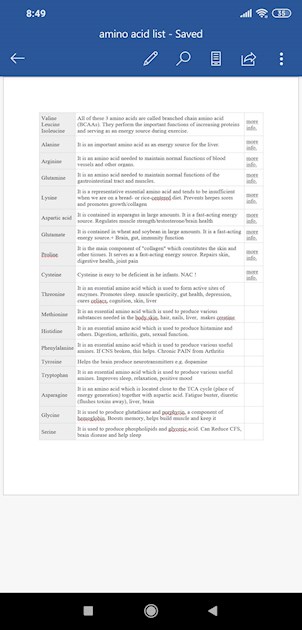Yes I take creatine (5g day) and several amino acids (all 21 if possible).
All of the above are very good for optimum muscle performance, especially recovery. Some amino acids are needed for cellular functions and brain health. No doctor will tell you this. You have to find out yourself. Lots of good information on bodybuilding.com which of course is all about muscle performance. Personally I am very angry that my neurologist has not told me anything about amino acids or Creatine. Creatine is actually made up of three amino acids anyway! In fact, I am so annoyed with my neurologist I am thinking of cutting the cord and going it alone.
Amino Acids are incredibly central to good health
There is 21 amino acids and each one has an important role in the body. They are needed to make up the proteins that have a dedicated role in the body.
There are 9 essential amino acids. Essential means the body can't make them. Their role and functions are:
Phenylalanine: Phenylalanine is a
precursor for the neurotransmitters tyrosine, dopamine, epinephrine and norepinephrine. It plays an integral role in the structure and function of proteins and enzymes and the production of other amino acids (4).
Valine: Valine is one of three branched-chain amino acids, meaning it has a chain branching off to one side of its molecular structure. Valine helps stimulate muscle growth and regeneration and is involved in energy production (5).
Threonine: Threonine is a principal part of structural proteins such as collagen and elastin, which are important components of the skin and connective tissue. It also plays a role in fat metabolism and immune function (6).
Tryptophan: Though often associated with causing drowsiness, tryptophan has many other functions. It’s needed to maintain proper nitrogen balance and is a precursor to serotonin, a neurotransmitter that regulates your appetite, sleep and mood (7).
Methionine: Methionine plays an important role in metabolism and detoxification. It’s also necessary for tissue growth and the absorption of zinc and selenium, minerals that are vital to your health (8).
Leucine: Like valine, leucine is a branched-chain amino acid that is critical for protein synthesis and muscle repair. It also helps regulate blood sugar levels, stimulates wound healing and produces growth hormones (9).
Isoleucine: The last of the three branched-chain amino acids, isoleucine is involved in muscle metabolism and is heavily concentrated in muscle tissue. It’s also important for immune function, hemoglobin production and energy regulation (10).
Lysine: Lysine plays major roles in protein synthesis, hormone and enzyme production and the absorption of calcium. It’s also important for energy production, immune function and the production of collagen and elastin (11).
Histidine: Histidine is used to produce histamine, a neurotransmitter that is vital to immune response, digestion, sexual function and sleep-wake cycles. It’s critical for maintaining the myelin sheath, a protective barrier that surrounds your nerve cells (12).
